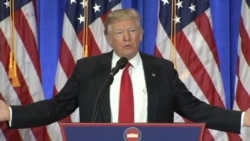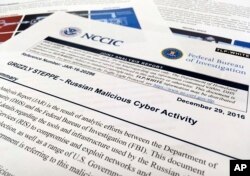Russian politics and security analysts expressed skepticism Wednesday about claims that Russian intelligence collected information and compromising video of President-elect Donald Trump.
“It does seem quite extraordinary in many ways and frankly hard to fully credit,” says Mark Galeotti, senior researcher at the Institute of International Relations in Prague. “Not because necessarily some of the individual allegations might not be true; but, the sense that any one individual could have gathered all this material.”
Information about the material, which remains unsubstantiated, was allegedly collected by a former British intelligence agent working for a private company. He allegedly handed it over to U.S. intelligence officials who passed it on to Trump as well as President Barack Obama last week.
Media reports say it involved a hidden camera and sex tape made at a hotel room in Moscow when Trump visited in 2013 as well as alleged contacts between Trump’s advisers and Russian officials.
Trump denied the existence of any such tape and was quick to dismiss the claims and implication that Russia could be using any compromising information against him.
WATCH: Trump thanks media for coming out against 'fake news'
Russians react
Kremlin spokesman Dmitry Peskov on Wednesday called the allegations “pulp fiction” and an attempt to harm bilateral ties. He denied Russia collected compromising material on anyone.
“It’s just the nature of the game,” says Galeotti. “You collect everything you can in the hope it will be useful. You deny everything you possibly can deny if and when it comes to light.”
Russia’s state television Channel One said the allegations were an attempt by what it called "Democrat-leaning U.S. media" to complicate the life of President-elect Trump.
Russian officials and state media have been demonizing the outgoing administration of President Barack Obama and raising hopes of better relations with the United States under a Russia-friendly Trump administration.
On the streets of Moscow, Russians echoed that line. “I think it is not true,” said 25-year-old import-export manager Denis. “I support the official version of the Kremlin. We don’t need this. We want normal relations between our countries.”
“I think they try to provoke us, but I do not understand why,” 29-year-old engineer Takhir told VOA.
“I guess that it’s based more on political conjecture than on any facts,” said Russian political analyst Yevgeny Minchenko. “And, I guess it’s not very good for the democracy in the U.S., but, at the same time, I would say the American political system is quite flexible. I do believe in democracy in the U.S. and I guess it can handle it.”
Timing questioned
Some of the allegations leaked from the report, just hours ahead of Trump’s first press conference after being elected, had been circulating over the last year as rumors.
The timing of the U.S. intelligence agencies' handing over the information to Trump, just days ahead of his inauguration as president, raised questions among some as to whether this could be a degree of payback for the president-elect’s disparaging remarks about the agencies.
“The very fact that precisely given such a sort of strong level of support by the intelligence community, that clearly has felt stung by Trump’s lack of respect for them and their judgments does seem potentially indicative of some kind of connection,” says Galeotti.
The real damage from the unsubstantiated allegations, notes Galeotti, is not likely to be against Russia or Trump but a further divide between supporters and detractors of the president-elect.
Ricardo Marquina Montañana, Olga Pavlova contributed to this report











